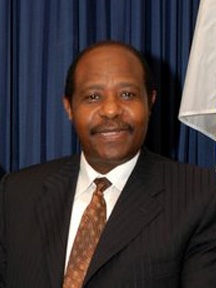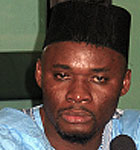
The International Criminal Tribunal for Rwanda was an international court established in November 1994 by the United Nations Security Council in Resolution 955 in order to judge people responsible for the Rwandan genocide and other serious violations of international law in Rwanda, or by Rwandan citizens in nearby states, between 1 January and 31 December 1994. The court eventually convicted 61 individuals at a cost of $1.3 billion.

The Interahamwe is a Hutu paramilitary organization active in the Democratic Republic of the Congo and Uganda. The Interahamwe was formed around 1990 as the youth wing of the National Republican Movement for Democracy and Development, the then-ruling party of Rwanda, and enjoyed the backing of the Hutu Power government. The Interahamwe, led by Robert Kajuga, were the main perpetrators of the Rwandan genocide, during which an estimated 500,000 to 1,000,000 Tutsi, Twa, and moderate Hutus were killed from April to July 1994, and the term "Interahamwe" was widened to mean any civilian bands killing Tutsi.

The Rwandan genocide occurred between 7 April and 15 July 1994 during the Rwandan Civil War. During this period of around 100 days, members of the Tutsi minority ethnic group, as well as some moderate Hutu and Twa, were killed by armed Hutu militias. The most widely accepted scholarly estimates are around 500,000 to 662,000 Tutsi deaths.

The Nyarubuye massacre is the name which is given to the killing of an estimated 20,000 civilians on April 15, 1994 at the Nyarubuye Roman Catholic Church in Kibungo Province, 140 km (87 mi) east of the Rwandan capital Kigali. The victims were Tutsis. Men, women, and children were reported to have been indiscriminately killed, with the attackers allegedly using spears, machetes, clubs, hand grenades and automatic weapons. Local Interahamwe, acting in concert with the authorities, used bulldozers to knock down the church building. The militia used machetes and rifles to kill every person who tried to escape.

Pauline Nyiramasuhuko is a Rwandan politician who was the Minister for Family Welfare and the Advancement of Women. She was convicted of having incited troops and militia to carry out rape during the Rwandan genocide of 1994. She was tried for genocide and incitement to rape as part of the "Butare Group" at the International Criminal Tribunal for Rwanda (ICTR) in Arusha, Tanzania. In June 2011, she was convicted of seven charges and sentenced to life imprisonment. Nyiramasuhuko is the first woman to be convicted of genocide by the ICTR, and the first woman to be convicted of genocidal rape.

Paul Rusesabagina is a Rwandan human rights activist. He worked as the manager of the Hôtel des Mille Collines in Kigali, during a period in which it housed 1,268 Hutu and Tutsi refugees fleeing the Interahamwe militia during the Rwandan genocide. None of these refugees were hurt or killed during the attacks.

Queen Dowager Rosalie Gicanda was the wife of Rwandan King Mutara III Rudahigwa. After her husband died in mysterious circumstances in 1959, the Rwandan monarchy lasted only two more years, under the leadership of King Kigeli V Ndahindurwa and then coming to an end with the Rwandan Revolution in 1961. However, the Queen continued to live in Butare in Butare Province, Rwanda, along with her mother and several ladies-in-waiting, where she was later murdered during the Rwandan genocide.
Jean-Paul Akayesu is a former teacher, school inspector, and Republican Democratic Movement (MDR) politician from Rwanda, convicted of genocide for his role in inciting the Rwandan genocide.
Léon Mugesera is a convicted genocidaire from Rwanda who took residence in Quebec, Canada. He was deported from Canada for an inflammatory anti-Tutsi speech which his critics allege was a precursor to the 1994 Rwandan genocide. In 2016, he was convicted of incitement to genocide and sentenced to life in prison.
Simon Bikindi was a Rwandan singer-songwriter who was formerly very popular in Rwanda. His patriotic songs were playlist staples on the national radio station Radio Rwanda during the war from October 1990 to July 1994 before the Rwandan Patriotic Front took power. For actions during the Rwandan genocide, he was tried and convicted for incitement to genocide by the International Criminal Tribunal for Rwanda (ICTR) in 2008. He died of diabetes at a Beninese hospital in late 2018.
Georges Henri Yvon Joseph Ruggiu is a Belgian radio presenter who worked for Rwandan radio station Radio Télévision Libre des Mille Collines, which played a significant role in promoting the genocide against the Tutsi. Like the station's other broadcasters, Ruggiu incited violence against Tutsi and moderate Hutu over the air. He had become involved in Rwandan politics just two years before the genocide.

Hassan Ngeze is a Rwandan journalist and convicted war criminal best known for spreading anti-Tutsi propaganda and Hutu superiority through his newspaper, Kangura, which he founded in 1990. Ngeze was a founding member and leadership figure in the Coalition for the Defence of the Republic (CDR), a Rwandan Hutu Power political party that is known for helping to incite the genocide.
Félicien Kabuga is a génocidaire and Rwandan businessman who played a major role in the run-up to the Genocide of the Rwandan Tutsis. A multimillionaire, he was closely connected to dictator Juvénal Habyarimana's Hutu nationalist MRND party and the Akazu, an informal group of Hutu extremists who helped lead the Rwandan genocide.
Tharcisse Renzaho is a Rwandan soldier, former politician and war criminal. He is best known for his role in the 1994 genocide against the Tutsi.
Ferdinand Nahimana is a Rwandan historian, who was convicted of incitement to genocide for his role in the Rwandan genocide.

Bernard Munyagishari is a Hutu man accused of having had a prominent role in the 1994 Rwandan genocide. According to the 2005 indictment against him, as a commander of the Interahamwe, he created a special unit for the rape and murder of Tutsi women. and also the massacre of Rwanda Patriotic Front led by Paul Kagame. He was arrested on 26 May 2011 in eastern Democratic Republic of Congo., he was 52 years old at the time of his arrest.

Grégoire Ndahimana is the former mayor of Kivumu, Rwanda. Indicted and arrested for alleged war crimes by the International Criminal Tribunal for Rwanda (ICTR), Ndahimana is thought to be one of the key figures in the 1994 Rwandan genocide, and is claimed to have had up to 6,000 Tutsi killed. In 2013, he was convicted of genocide and crimes against humanity and sentenced to 25 years in prison.
Emmanuel Rukundo is a Rwandan Roman Catholic priest who in 2009 was convicted of genocide and crimes against humanity by the International Criminal Tribunal for Rwanda (ICTR) for his participation in the 1994 Rwandan Genocide.
The following lists events that happened during 2009 in Rwanda.
Beatrice Munyenyezi is a Rwandan woman known for her alleged involvement in the Rwandan Genocide. She sought political asylum in the United States where she successfully applied citing persecution in her home country. Almost two decades later, in 2013, a US court prosecuted Beatrice for lying about her political affiliation during the Rwandan Genocide. She was stripped of her American citizenship and was given a ten-year sentence.







